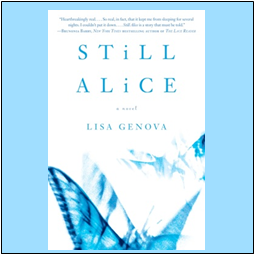
Book Review
by Pat Bertschy
“STiLL ALiCE”
A novel by Lisa Genova
Pocket Books Publishing House, 2009
“I must be losing my mind,” we say when we forget some day-to-day detail, or find ourselves in a situation that is muddled or difficult. The feeling we are expressing is helplessness, loss of control. How frightening it would be to really lose one’s mind and know it. That is the subject of Lisa Genova’s Still Alice, the story of a fifty-year-old woman losing her mind to early onset Alzheimer’s.
The main character, Dr. Alice Howard, is an eminent Professor of Psychology at Harvard University, happily married with three grown children. In this hauntingly realistic novel, Alice begins to notice she cannot recall simple words or finish her thoughts. As a specialist in cognitive psychology, Alice recognizes the symptoms, but is unwilling to believe she may be developing the disease.
As her doctor explains to her, she has fifty neurons sending information in her brain, compared to the average person’s ten, so the interruptions are less noticeable at first. But she does notice, and is riddled with anxiety and sadness knowing that she will someday – soon – lose her mind, her memory, her cognitive ability, and her language.
This is a heart-breaking and terrifying story. Alice knows that in a short time she will no longer recognize her husband or her children. She brings the reader on her journey into forgetting so realistically that it’s hard to remember this is not memoir. The reader lives each day with Alice and experiences her disintegration, and wonders how much time is left to know that she is forgetting.

The journey is marked by Alice’s attempts to control her symptoms and direct her life, although she realizes this will not be possible for very long. We experience her husband and children’s reactions to her memory loss as she does. We feel the transformation with Alice as she becomes, in some ways, not Alice.
Alice thinks about her love for her daughter, and is afraid she won’t remember that she loves her. She wonders whether her love for her family lives in her head or in her heart?
When her daughter tells the advanced stage Alzheimer’s Alice about the man she is seeing, Alice does not have the presence of mind to know who her daughter is, but has the presence of heart to ask her the poignant questions, “How do you feel when you are with him? How does he feel with you?”
Still Alice raises powerful questions: Should there be a health care directive for dementia? What would you tell your family in advance about the care you would want when you can no longer recognize your own life? How would you live your last weeks knowing that soon you won’t know your husband, your children?
Reviewed by Pat Bertschy, an avid reader who lives in Brewster.
Return to the Literary Women pageGood Intentions
by Nikole Jalbert
There comes a day when
I will - becomes
I should have.
And that sad day is so final that it breaks things,
And leaves nothing but regret.
We are all so busy, busy, busy, with our lives,
We make longer and longer lists of I will’s,
And set ourselves up for more I should have’s.
That classic expression of “stop and smell the roses”
Is tossed around far too carelessly,
Because a life should be full of I am,
Not I will,
And it ought not end with I should have.
Nikole Jalbert is a poet and prolific writer from Eastham
 |
 |